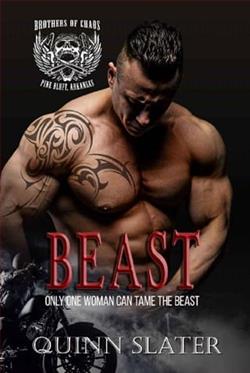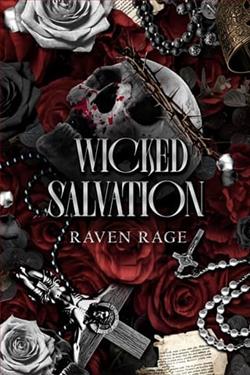Page 34 of The Wicked Lies of Habren Faire
As I climb the high steps, I finally let myself stare.
The palace is a thing from myth. Turrets rise in a hundred layers, with waterfalls interrupting staircases and forests where buildings would be. Golden roofs touch the sky and wink down at us, while thousands of windows observe Eu gwlad for what must be miles. People on balconies take tea and gossip. Gardens recline around the base, organized by color and hue to create a rainbow of flowers.
I’m making a pig’s ear of this. Let me try something else.
Imagine what magic smells like to you (we can’t all love wisteria and baking bread), then picture wonders to rival the ocean. Imagine the place where the fairy tales of your childhood happened, when your mother lay beside you in bed and whispered stories in your ear.
You’re halfway there.
Great ivory doors tower over us, but we avoid them entirely. They’re carved with tales from theMabinogion, and I search for heroes within them as if they are old friends, but we’re gone before I can find my sister’s namesake.
We round the base of the palace to be faced with a small, nondescript door, and I understand exactly where we’re going—the kitchens.
Workers always enter the big house through the kitchens.
The kitchen is hot as a furnace. Elements of it I recognize—a pot over a roaring fire, large counters to prepare food—but others are wholly foreign. A copper door opens and a waft of freezing, ghostly air escapes from it. Great glass windows contain a blazing heat. A pipe of endless water pours into the sink without anyone to pump it. I’m caught so off guard that I almost miss the teg that operate the kitchen. They’rebwbach: house helpers who perform chores in exchange for offerings. They stand no higher than my knees and usea maze of platforms suspended from the ceiling to reach each station. Among them a lumbering ogre barks orders, ducking inelegantly to avoid the walkways.
We take a narrow passage to a tight, winding servants’ staircase that lets out into a grand hall. It has the tallest ceiling I’ve ever seen, by which I mean real clouds float across the fresco above us. Marble corridors sprout from the hall in every direction, twisting away from us, and paintings line the walls, though the scenes from teg history they depict mean little to me.
An oak door blocks our way, until it opens without being touched by the sentries on either side. Beyond it, a short set of stairs descends into a vast sunken reception area, framed by walkways and pillars on all sides, that runs toward a raised throne. A rug of spun metals—silver, gold, copper, platinum—runs in a straight line to a dais set before four stained-glass windows. Every few moments the shards shift and create new pictures: the seasons blur into times of day, and times of day into a bestiary. The throne atop the dais dwarfs all: gold rises high and spills over the steps like a wave, and within it there are carvings of fairies and revels, animals fleeing a hunt, and entire towns and villages flanked by bountiful farms.
The excess is unfathomable. Disgust creeps up my throat.
I hardly register the movement of my feet toward the dais until the guard stops a few steps away from it. He sweeps into a low bow that I copy. We rise, and I get my first glimpse of the king.
His profile is angular, and his eyes are blue—the only color in his otherwise ghostly face. His skin is unlined, but age radiates off him in waves. Hefeelsold. He’s like a Roman ruin: eternal against the seasons, against the growth of nearby towns, against time. We could make a museum of him and he wouldn’t notice. That sense of timeless, withering weariness is at odds with his beauty. His robes match the white and gold of his palace. Suddenly it feels comforting that Neirin tries to dress like a boy from my village, because if hewore the jeweled garments favored by this court I don’t think I could look at him.
But my eyes are drawn away from the king quickly to the woman in white at his side.
She has waist-length red curls and a face like that of a girl in a fashion plate, all plump lips and rosy cheeks. Butterflies, dragonflies and furry-winged moths cling to her white slip like she’s both a flower and a flame. They’ve eaten holes in the fabric, and some burrow in her hair. Their wings flutter, but they never fly away. I can’t imagine why they would want to.
Her eyes widen almost imperceptibly as they land on me, and when our gazes lock, her lips quirk. For a second I fear I’ve been dragged into another petty fairy game, but then the woman tucks her hair behind one ear and reveals a rounded shell no different from mine.
The king has a human consort. She is lovely and cosseted, a treasure locked away in a palace.
“Your Majesty King Emrys,” the guard says, “I present another volunteer.”
The king looks me up and down, bored, then flicks a hand to beckon me toward him. I want to stay where I am, to ignore him entirely—I doubt he’s ever experienced that—but I need him to accept me as a champion. I take a reluctant step forward but do nothing to fix my frown.
“Another prospective champion?” he says flatly. “Thrilling.”
I lift my chin. “Not another champion.Thechampion.”
There’s a beat of silence, and then his laughter booms through the hall. Maybe I deserve it. I do stand before him unarmed and in a nightgown, after all.
He stops laughing abruptly. “Your name?”
“Habren. Habren Faire.”
I have no idea why I’ve tacked Neirin’s nickname for me ontomy false name. Perhaps just because I like the sound of it. I hope he doesn’t find out about this; he’ll be very annoying if he does, though it means little.
“And you traveled here alone?”
“I have sight,” I tell him. “It was no trouble.”
“Indeed?” he says drolly.
I stand tall, trying to make myself bigger than I am, like a hero from one of Dad’s stories.















